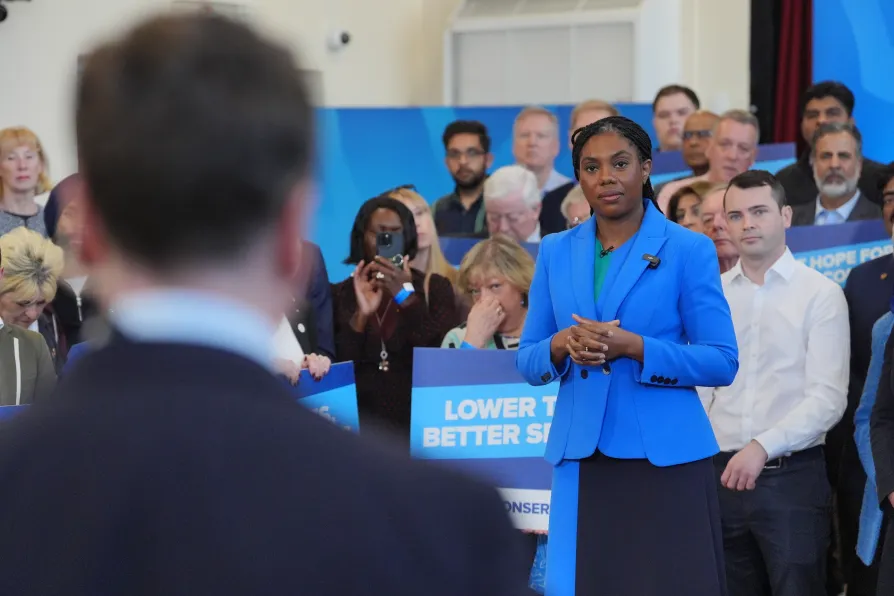John Wojcik pays tribute to a black US activist who spent six decades at the forefront of struggles for voting rights, economic justice and peace – reshaping US politics and inspiring movements worldwide
KEITH FLETT traces how the ‘world’s most successful political party’ has imploded since Thatcher’s fall, from nine leaders in 30 years to losing all 16 English councils, with Reform UK symbolically capturing Peel’s birthplace, Tamworth — but the beast is not dead yet

 Conservative Party leader Kemi Badenoch at their local election campaign launch at The Curzon Centre in Beaconsfield, Buckinghamshire, March 20, 2025
Conservative Party leader Kemi Badenoch at their local election campaign launch at The Curzon Centre in Beaconsfield, Buckinghamshire, March 20, 2025
THE TORIES were reduced to 121 seats on July 4 2024, with a range of well-known Tory MPs losing their seats. Whatever the view on Keir Starmer, there was cause for brief celebration on July 5, as there was on May 2 1997, when Blair came to office.
Tory leader Rishi Sunak resigned, and after a protracted leadership election, which suggested Tory membership was, in the autumn of 2024, at around 120,000, Kemi Badenoch defeated another hard-right candidate, Robert Jenrick.
On May 1 2025, the Tories lost all 16 English councils they were defending and over 600 councillors as well.
Symbolically, in Tamworth, where Robert Peel wrote the declaration that was the foundation of the modern Tory Party in 1834, all three council seats on Staffordshire Council were won by Reform UK candidates.
Opinion polls are unreliable predictors of opinion, but the Tories regularly achieve low numbers. The mostly right-wing media is more interested in Starmer’s Great Moving Right Show, but consideration of the Tory crisis can be found in the comment pages.
Robert Shrimsley, writing in the Financial Times, noted that while the Tories might be seen as “the world’s most successful political party,” in reality they are “currently losing a fight to the death.” Meanwhile, in the Times, former Tory chancellor Jeremy Hunt noted that while he didn’t think the Tories would become extinct, they might well not be one of the two major parties at future elections.
A striking extract from Bloody Panico, a book Geoffrey Wheatcroft published in 2024, points to one of the reasons for the Tory crisis:
“Lord Salisbury, Stanley Baldwin, Winston Churchill and Margaret Thatcher each led the Conservatives for roughly 15 years. In the 30 years since the fall of Thatcher the Tories have had nine leaders including five prime ministers in the space of seven years … 2022 will be remembered as the year of two monarchs and three prime ministers, not to mention four chancellors of the exchequer, five education secretaries and more than 30 resignations from government.”
There are wider historical points to consider. The Tories are the historic party of British capitalism. The mother of the magistrate William Hulton, who sent the Yeomanry in at Peterloo in 1819, had a horse called Church and King. That neatly sums up what the Tory Party still stands for, at the root of which is a defence of property.
As the 80th anniversary of D-Day is marked, we know that if a crisis becomes too serious, ruling classes, in the case of the second world war, for example — Germany, Italy and France — can be prepared to let fascist parties rule. The aim being to crush working-class organisation and defend profit.
In the world of 2025, parties of the far right, more extreme than traditional right-wing politics, can be found in power in the US, Italy and Argentina — and challenging strongly elsewhere.
That means there is perhaps in Britain a chance for Reform UK to rule. However, it’s unlikely that capital would be happy with its affairs being run by the political business of Nigel Farage. Hence, no doubt talk about different leaders.
History suggests another possibility. In 1886, a large number of Irish Nationalist MPs demanding Home Rule for Ireland were elected to the Commons. One significant result, as Eric Hobsbawm notes in The Age of Empire, was the rush of Liberal millionaires and businessmen to the Tory Party, which stood resolutely against any form of Irish democracy.
Such a reconstitution of politics on the right opened up space for left and working-class political organisation to develop. By 1921, there was a 26-county Irish state. In 1924, the first Labour government took office.
A crisis on the political right is an opportunity for the left.
Keith Flett is a socialist historian. Follow him on X @kmflett.

It’s not just the Starmer regime: the workers of Britain have always faced legal affronts on their right to assemble and dissent, and the Labour Party especially has meddled with our freedoms from its earliest days, writes KEITH FLETT

Who you ask and how you ask matter, as does why you are asking — the history of opinion polls shows they are as much about creating opinions as they are about recording them, writes socialist historian KEITH FLETT

Research shows Farage mainly gets rebel voters from the Tory base and Labour loses voters to the Greens and Lib Dems — but this doesn’t mean the danger from the right isn’t real, explains historian KEITH FLETT










